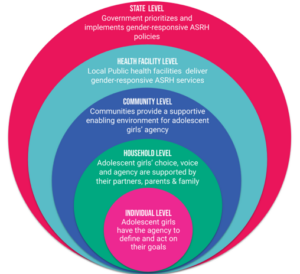“Flash back. Close your eyes. Remember what you were like when you were 15 years old. What did you dress like? Which people surrounded you? What did you fear? What did you want in life?”
Catherine, an Adolescents 360 (A360) Innovation Officer, guides 30 mothers who have gathered this Tuesday morning at the Safina Clinic in Dar es Salaam for a Kuwa Mjanja “Be Smart” workshop.
The mothers have been invited by A360 to learn how Kuwa Mjanja can help their daughters lead healthier lives.
The mothers take turns sharing their memories — some light hearted and some directly related to why we’ve all gathered here.
“I used to play football. I loved sports.”
“I went to a boarding school, but there wasn’t much food. We “gave ourselves” to the cooks so we could eat better.”
“I met a bus driver on my way to school and was tempted.”
Catherine asks the mothers to flash back so they can relate better to the challenges their daughters are facing. In Tanzania, parents typically don’t talk to their children about contraception or pregnancy prevention. That is why PSI, alongside a consortium of partners, has created Kuwa Mjanja, a program that focuses on preventing unplanned pregnancy among girls aged 15-19 by co-creating programs with the teens they serve.

Catherine introduces the mothers to Maria Anatoli, a health care provider who PSI has trained to talk to teens about contraception.
The goal of the gathering today is to encourage mothers to invite their teenage daughters to a “social club” that will happen on Saturday. Maria will be on hand to talk to their daughters about pregnancy prevention and give them a contraception method if they choose.
A secondary goal is to create a community of mothers who help each other stand firm when it comes to talking to young women about sex.
One mother stands up and says, “We have to unite and work as one.” She elaborates, “Parents, we don’t have cooperation from other parents. We have to support community health workers when they come to our homes.”
Another mother chimes in — critical about another NGO program which rewarded girls with money for attending clinic days like this one. “We need to tell our daughters that knowledge and education is more important than money.”
Catherine asks how many mothers will invite their daughters and everyone raises their hands. She passes out special invitations branded in teen-friendly colors with the Kuwa Mjanja logo — a pineapple.
Catherine says, “Pineapples are special. They stand tall—they are proud! They wear a crown, like a queen who knows her worth and demands respect. And even though they are tough on the outside, they are beautiful and sweet on the inside. Just like our daughters.”
The need to reimagine reproductive health care for teens in Tanzania is urgent. 45% of the population is under the age of 15 and 44% of girls become pregnant by age 19. PSI’s Adolescent 360 program meets teens where they are — outside of clinics — and with language and activities that make sense for them.
Adolescents 360 (A360) is a four-and-a-half year initiative co-funded by the Bill & Melinda Gates Foundation and the Children’s Investment Fund Foundation (CIFF). The project is led by Population Services International (PSI) together with IDEO.org, University of California at Berkeley Center on the Developing Adolescent, the Society for Family Health Nigeria, and Triggerise. The project is being delivered in Ethiopia, Nigeria and Tanzania, in partnership with local governments, local organizations, and local technology and marketing firms. In Tanzania, A360 is building on an investment and talent from philanthropist and design thinker Pam Scott.



